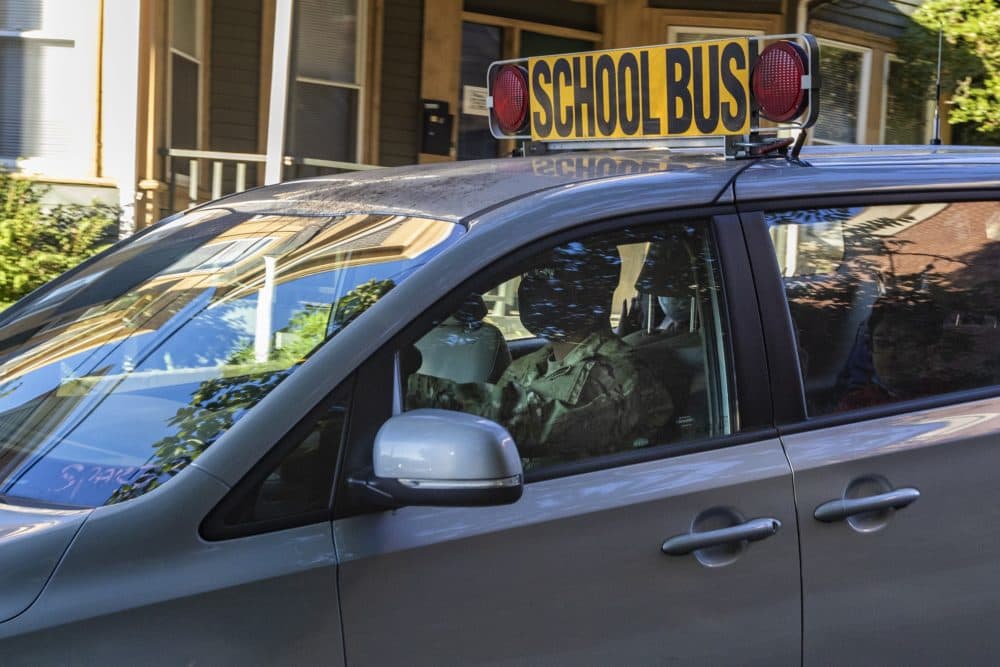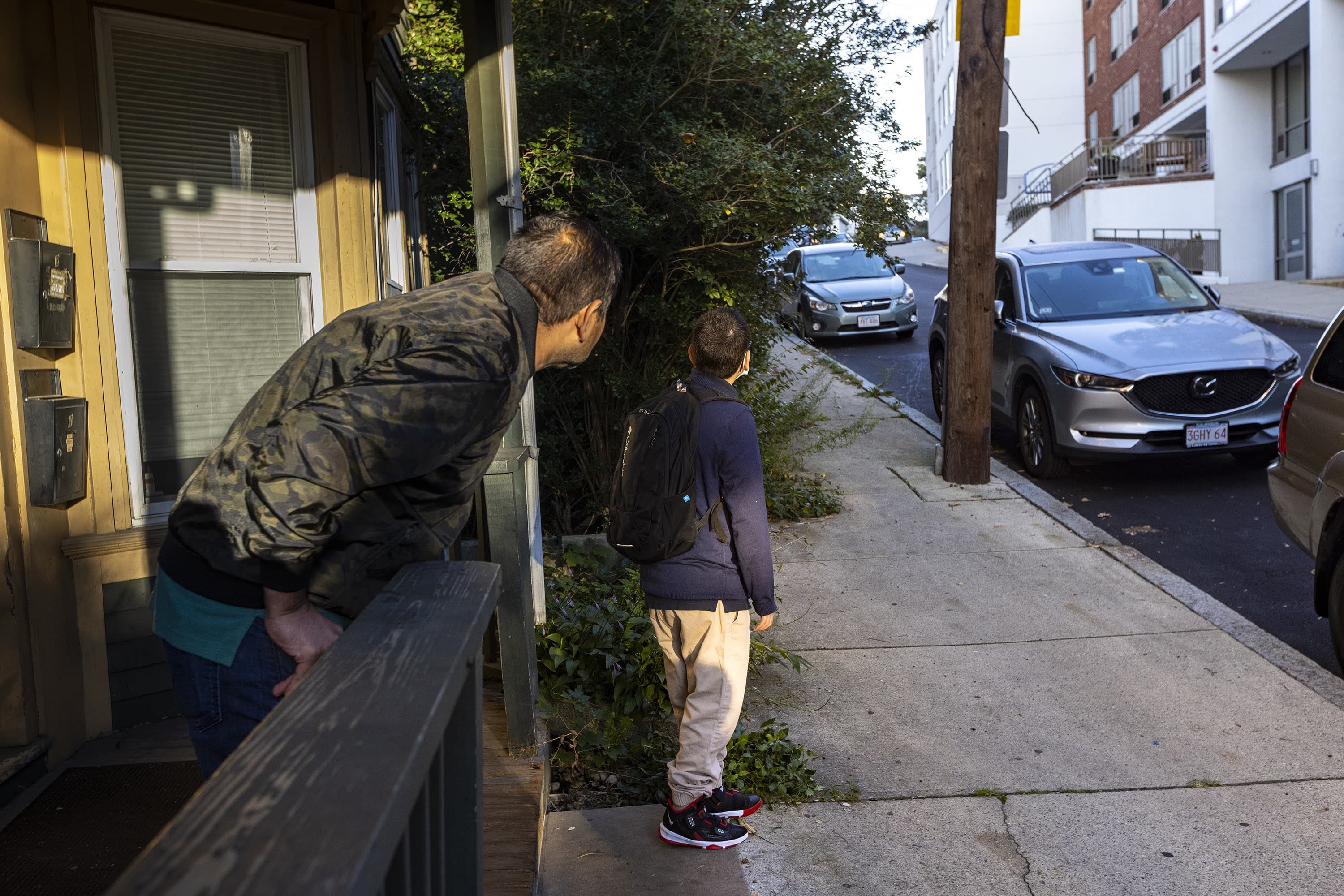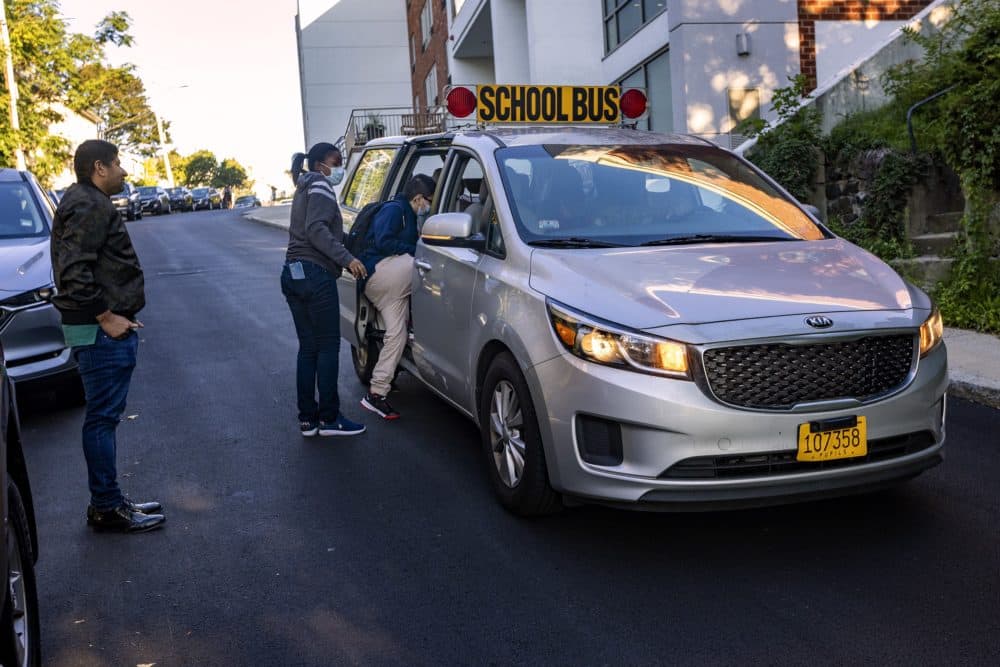Advertisement
The National Guard is easing school bus struggles, districts say. So are new Spanish-language driver tests
Resume
On a recent weekday, Jaime Carillo and his son waited for the ride to school in their usual spot on the front porch of the family’s duplex. When classes first started, the two were spending a lot of time there; the van that takes his son to school was coming much later than its 7:28 a.m. scheduled arrival.
"During the first three weeks of school I had to start dropping him off myself because they would come here around 8 [a.m.]," explained Carillo. "[The school] said that because there weren't enough drivers they had to pick kids up in two groups each morning."

But ever since the National Guard came to help Chelsea Public Schools with transportation, things changed for the Carillo family. The van now comes on time. Carillo's son is one of about 15 students in the district that's getting a lift from one of the uniformed officers.
"I feel good about it and more secure," said Carillo. "I'm happy they brought in the [National Guard] drivers."
Carillo appreciates predictability, and said he likes seeing the Guard members around. They were in the city a lot during the pandemic, helping out with food distribution and vaccinations.
"I think it’s normal to see them," he added. "More than anything, they're welcome."

Hearing that kind of response from a parent was a relief for district Superintendent Almi Abeyta. When she first agreed to bring the National Guard in to help with transportation, she worried how parents would feel about people in military uniforms picking up kids, especially in this city, where about 45% of the residents are foreign-born and some are undocumented.
"I always want to make sure our families feel safe and that our children feel safe," said Abeyta. "I don’t want to raise any fear in anyone."
Parents in the Special Education Parent Advisory Council (SEPAC) in Chelsea had other concerns when they first heard the National Guard was coming.
"They’re dealing with children who are neurodiverse, who have many disabilities and may have also had a traumatic experience crossing the [U.S.] border," said Angelica Bachour, secretary of Chelsea's SEPAC.
Bachour wondered if the National Guard would have enough training to take care of kids with special needs. But, she added, the district and the SEPAC talked a lot to address the group’s concerns. Officials with the bus company said they're giving the National Guard members the same training they give everyone who drives students with special needs.
"We did do some student management with the guards to identify certain things that are going on in the vehicle," explained John McCarthy the CEO of NRT, Chelsea’s bus contractor. "And then they can come back and tell us, 'Look this student might be better off with someone else.' But that has only happened once."
McCarthy said his main concern now is driver recruitment, and he's currently feeling optimistic about it. He noticed an increase in driver applications after federal unemployment benefits expired in early September. McCarthy said he's very excited about one recent change from the Registry of Motor Vehicles: The qualification test will now be offered in Spanish. So far 22 people have taken the translated version.
"That was a huge shift to allow this testing to be done in Spanish," said McCarthy. "Now have we done it in all languages? No. But we started with the Latino community because many of them work as [bus] monitors for a us now, and we’d like to get them behind the wheel."
Since early September, 85 applicants passed the test, McCarthy said, and they now fill open driving positions in districts NRT contracts with across the state.
Back in Chelsea, on the Carillo family's front porch, Jaime and his son stood waiting for the school van. It was nearly 8 a.m. The van was late.
"It’s the first time they’ve been late since the National Guard came," explained Carillo.
Luckily, it was just around the corner and showed up a couple of minutes later.
Officials at Chelsea Public Schools said staffing is still tight and delays can still happen on their bus routes — even with the National Guard. But at least now it’s more the exception than the rule.
El Planeta's Tibisay Zea contributed to this report.
This segment aired on October 12, 2021.
